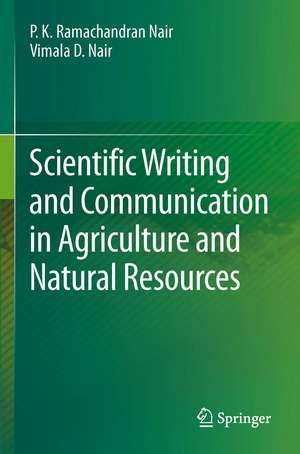Scientific Writing and Communication in Agriculture and Natural Resources
Autor P. K. Ramachandran Nair, Vimala D. Nairen Limba Engleză Paperback – 16 ian 2014
Preț: 492.40 lei
Preț vechi: 579.30 lei
-15% Nou
Puncte Express: 739
Preț estimativ în valută:
94.25€ • 102.41$ • 79.22£
94.25€ • 102.41$ • 79.22£
Carte tipărită la comandă
Livrare economică 21 aprilie-05 mai
Preluare comenzi: 021 569.72.76
Specificații
ISBN-13: 9783319031002
ISBN-10: 3319031007
Pagini: 156
Ilustrații: XII, 142 p. 20 illus., 7 illus. in color.
Dimensiuni: 155 x 235 x 8 mm
Greutate: 0.23 kg
Ediția:2014
Editura: Springer International Publishing
Colecția Springer
Locul publicării:Cham, Switzerland
ISBN-10: 3319031007
Pagini: 156
Ilustrații: XII, 142 p. 20 illus., 7 illus. in color.
Dimensiuni: 155 x 235 x 8 mm
Greutate: 0.23 kg
Ediția:2014
Editura: Springer International Publishing
Colecția Springer
Locul publicării:Cham, Switzerland
Public țintă
Professional/practitionerCuprins
Preface.- Part 1: Essentials for Good Writing.- 1. Introduction.- 2. Organization of a Research Paper: The IMRAD Format.- 3. Tables and Figures.- 4. The “Nuts and Bolts”: Numbers, Units, Dates, Abbreviations, Nomenclature.- Part 2: English – The International Language of Science.- 5. Words.- 6. Sentences.- Part 3: Manuscript: Preparation, Submission, and Follow-up.- 7. Preparing the Manuscript.- 8. Dealing with the Journal.- Part 4: Oral and Poster Presentations.- 9. Oral Presentations.- 10. Poster Presentations.- References and Recommended Reading.- Subject Index.
Textul de pe ultima copertă
Perhaps there is no dearth of books, reference manuals, and internet sources on scientific writing. Given, however, that different fields have different conventions for writing style, we have found it difficult to recommend a specific book or source material as the “go to” guide to young scientists in agriculture and natural resources. Having been involved as authors, reviewers, and editors of various journals and publications during the past few decades, we have come to the conclusion that writing a scientific paper is a tedious task for not only us, but most writers. While that is true even for experienced writers, it is a sort of nightmare for the early career professionals such as students, trainees, scientists, and scholars in agriculture and natural resources, especially when their first language of communication is not English. Their trials, tribulations, and frustrations are compounded by the severe pressure they experience from the increasing importance attached to authoring scientific publications (in English). This book is targeted mainly to that group.
The ten short chapters of the book are organized in four parts. The first, “Essentials for good writing,” contains four chapters that emphasize the importance of publishing research results, review briefly the various types of scientific publications and other important features of scientific writing. The second part that includes two chapters deals with the use and misuse of English as the international language of science. Manuscript preparation and submission is the scope of the third part that also has two chapters. Part 4 is about communication of research results through oral and poster presentations to the peer groups at conferences and meetings. Finally, a list of references and recommended reading is included.
The ten short chapters of the book are organized in four parts. The first, “Essentials for good writing,” contains four chapters that emphasize the importance of publishing research results, review briefly the various types of scientific publications and other important features of scientific writing. The second part that includes two chapters deals with the use and misuse of English as the international language of science. Manuscript preparation and submission is the scope of the third part that also has two chapters. Part 4 is about communication of research results through oral and poster presentations to the peer groups at conferences and meetings. Finally, a list of references and recommended reading is included.
Caracteristici
Easy-to-follow instructions, based on the authors’ long international experience, on how to prepare manuscripts for high-quality journals Useful tips on how to deal with journals and what to do when a paper is rejected Step-wise procedures and guidelines on oral and poster presentations at professional meetings Focus on early career professionals including graduate students whose first language of communication is not English Includes supplementary material: sn.pub/extras



